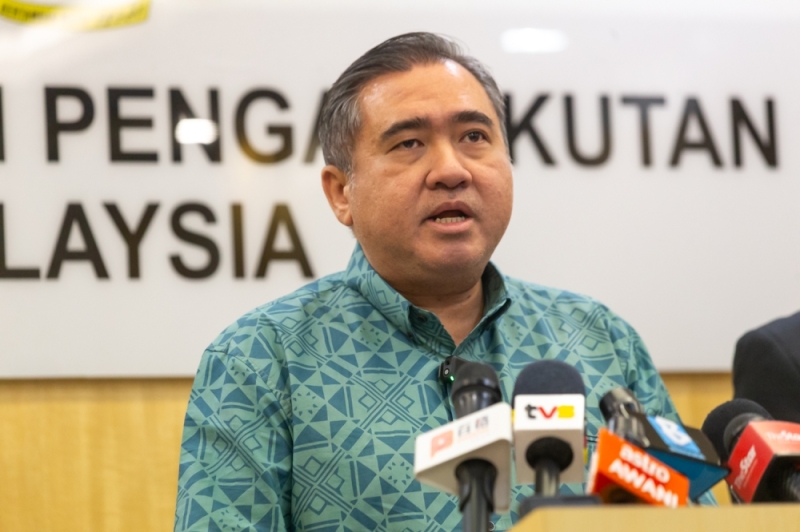Transport minister: Bills for Mavcom, CAAM merger to be tabled in Parliament

Minister of Transport Anthony Loke Siew Fook speaks during a press conference in Putrajaya June 13, 2024 — Picture by Raymond Manuel
Thursday, 13 Jun 2024 2:39 PM MYT
PUTRAJAYA, June 13 — Two Bills will be tabled in the upcoming Parliament session this month to facilitate the merging of the Malaysian Aviation Commission (Mavcom) and the Civil Aviation Authority of Malaysia (CAAM).
Transport Minister Anthony Loke said on June 5 the Cabinet agreed to table the Malaysian Aviation Commission (Dissolution) Bill 2024 and the Civil Aviation Authority of Malaysia (Amendment) Bill.
He clarified that the decision follows the Cabinet’s in-principle approval on Dec 11, 2019, to dissolve Mavcom and transfer all its functions to CAAM.
“The regulatory framework for Malaysia’s aviation industry will undergo restructuring, consolidating it under a unified entity to promote the growth of the civil aviation sector in accordance with the government’s strategy to enhance global competitiveness,” he announced during a press conference earlier today.
He added that these reforms also aim to reduce bureaucratic hurdles and improve the civil aviation service delivery system, especially in licensing services.
“With the merger of Mavcom and CAAM, there will no longer be a need to obtain separate approvals from two agencies.
“Instead, a single government entity will process technical approvals and issue licences,” he said.
Loke explained that such a unified mechanism is adopted by several countries in the global aviation sector, including the United States, United Kingdom, Germany, Singapore, and the People’s Republic of China.
“These reforms will optimise the use of existing human and financial resources, including establishing a group of economic and technical experts under one entity.
“This will ensure effective compliance with national and international civil aviation obligations based on standards and practices set by the International Civil Aviation Organisation (ICAO),” he added.
Queried on the timeline for the merger to be completed, Loke responded that it is anticipated to be concluded next year.
“The Bills will be debated and passed in Parliament. However, after that the merger will take some time to conclude,” he said.
Mavcom was established to oversee economic matters related to Malaysia’s civil aviation industry and to provide provisions for regulatory functions in related matters.
Whereas CAAM is responsible for the technical oversight of the country’s civil aviation in line with ICAO’s technical procedures and safety standards. — Bernama
Thursday, 13 Jun 2024 2:39 PM MYT
PUTRAJAYA, June 13 — Two Bills will be tabled in the upcoming Parliament session this month to facilitate the merging of the Malaysian Aviation Commission (Mavcom) and the Civil Aviation Authority of Malaysia (CAAM).
Transport Minister Anthony Loke said on June 5 the Cabinet agreed to table the Malaysian Aviation Commission (Dissolution) Bill 2024 and the Civil Aviation Authority of Malaysia (Amendment) Bill.
He clarified that the decision follows the Cabinet’s in-principle approval on Dec 11, 2019, to dissolve Mavcom and transfer all its functions to CAAM.
“The regulatory framework for Malaysia’s aviation industry will undergo restructuring, consolidating it under a unified entity to promote the growth of the civil aviation sector in accordance with the government’s strategy to enhance global competitiveness,” he announced during a press conference earlier today.
He added that these reforms also aim to reduce bureaucratic hurdles and improve the civil aviation service delivery system, especially in licensing services.
“With the merger of Mavcom and CAAM, there will no longer be a need to obtain separate approvals from two agencies.
“Instead, a single government entity will process technical approvals and issue licences,” he said.
Loke explained that such a unified mechanism is adopted by several countries in the global aviation sector, including the United States, United Kingdom, Germany, Singapore, and the People’s Republic of China.
“These reforms will optimise the use of existing human and financial resources, including establishing a group of economic and technical experts under one entity.
“This will ensure effective compliance with national and international civil aviation obligations based on standards and practices set by the International Civil Aviation Organisation (ICAO),” he added.
Queried on the timeline for the merger to be completed, Loke responded that it is anticipated to be concluded next year.
“The Bills will be debated and passed in Parliament. However, after that the merger will take some time to conclude,” he said.
Mavcom was established to oversee economic matters related to Malaysia’s civil aviation industry and to provide provisions for regulatory functions in related matters.
Whereas CAAM is responsible for the technical oversight of the country’s civil aviation in line with ICAO’s technical procedures and safety standards. — Bernama
***
kt comments:
Not advisable - kaytee strongly disagrees with the two agencies merging. One (Mavcom) is about financial-economic matters whilst the other (CAAM) is about safety regulations. Guess who will win if economic imperatives clash with safety regulations - we will then see CAAM backtracking (or told to 'back off') whilst Mavcom will definitely dominate, all at the expense of safety regulations. I have seen all these happening in Australia, and the results had been disastrous.
Noted for the comment.
ReplyDeleteThat KT comments sound logical in practice. But in reality, cross agency interferences occur everywhere & every time when interests, whether personal or group, r involved.
ReplyDeleteThus, no difference! Not just in m'sia!
Merging that two agencies save money & reduce the cultivation of Deadwoods within ALL aspects of the bolihland civil administration.
There is no one panacea.
ReplyDeleteMany countries have had 1 Civil Aviation regulator for decades that oversees both safety and commercial controls, just different departments.
This helps prevent duplication of the bureaucracy, where air operators have to deal with multiple agencies that don't talk to each other and may be at loggerheads.
There is a case that safety must not be overruled by commercial considerations, but this can be handled by laws that stipulate the independence of the safety regulatory staff.